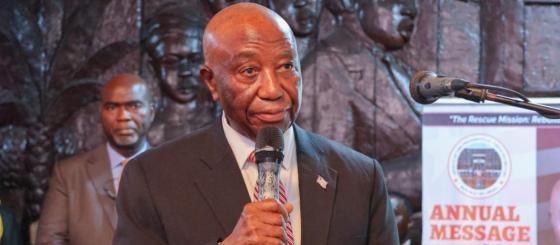Liberia: “Faith in Justice System Declining”
— Says President Boakai
President Joseph Boakai, in his State of the Nation Address on Monday, January 29, believes that people’s faith and trust in the justice system are declining.
“Our justice system, which is meant to protect the innocent and punish the guilty, has been marred by inefficiency and a lack of public trust," the president said.
The ability of courts throughout the country to fulfill their mission and perform their functions is based on the public’s trust and confidence in the judiciary, which must earn and sustain that trust and confidence by faithfully performing its duties, adhering to ethical standards, and effectively carrying out internal oversight, review, and governance responsibilities.
Liberians are losing trust and confidence because of the failure of judicial actors to hold judges and judiciary personnel accountable for misconduct.
Transparency in efforts to ensure accountability for misconduct, where possible and appropriate, helps foster public trust and confidence.
Speaking to his audience, President Boakai did not withhold his frustration when he said: “Anyone caught in the act of corruption will face the full weight of the law with swift and non-discriminatory enforcement.”
The President likewise encouraged lawmakers to pass laws for financial appropriation if they would be successful in tackling corruption in the judiciary.
“I am counting on this honorable body to pass effective legislation and support financial appropriation that will help us with the fight against corruption. Anyone caught in the act of corruption will face the full weight of the law with swift and non-discriminatory enforcement,” the president noted.
He said his commitment to good governance is unwavering transparency, accountability, and the rule of law “that will guide our actions. We will fight corruption and build institutions that serve the people's interests.”
According to him, he will run a government that is accountable to its citizens, a government that can truly serve the needs of its people.
The President is not the only one who is wary of the country’s justice system. It is no secret that the overall reputation of Liberia’s judiciary has come under scrutiny, both locally and internationally, with allegations of pervasive corruption. Numerous international human rights reports have criticized the perceived lack of integrity and transparency within the system.
Senior judicial figures, including Associate Justice Yusuf D. Kaba and Judge Nancy Sammy, admit that the system is corrupt and have highlighted the need for reforms to address this issue.
Justice Kaba told the public that the judiciary is the “black cow” of the government.
“We don’t tell ourselves the truth; go and read the American Department of State report,” Kaba said at the opening of the Second Judicial Circuit Court in Buchanan, Grand Bassa County, in November 2021. “The Judiciary has been tarnished because of so many bad peanuts that have gotten involved with the Judiciary System,” he said, adding that some judicial actors who do not have consciences are damaging the Judiciary System.
He urged judges to change their behaviors, warning that the contrary would see citizens lose confidence in judicial institutions, something he said would cause chaos in the country.
“We want to advise members of the judiciary to desist, or else the citizens will lose confidence in all of us very soon,” he said.
Judge Sammy, president of the National Trial Judges Association of Liberia, also acknowledged the prevalence of corruption within the judiciary. “It is a fact that the judiciary is corrupt,” the judge said at the 2022 Law Day celebrations at Monrovia City Hall.
The U.S. Department of State’s 2022 Country Report on Human Rights Practices in Liberia specifically mentioned that judges and magistrates were susceptible to influence and engaged in corrupt practices. The report raised concerns about solicitation of bribes for favorable outcomes in trials, undue pressure on judicial officials, and predetermined trial outcomes, particularly when defendants had political or social connections.
“Defense attorneys and prosecutors reportedly directed defendants to pay bribes to secure favorable decisions from judges, prosecutors, and jurors or to have court staff place cases on the docket for trial,” the report said. “Some judicial officials and prosecutors appeared subject to pressure, and the outcome of some trials appeared to be predetermined, especially when the accused persons were politically connected or socially prominent.”
Previous annual reports from the U.S. State Department have also condemned the judiciary, at one point terming it the most corrupt institution in the country.

